Postpartum jellyfish, filling your cup and an Hermès mum hack
MUMISH Meets Frida Mom Founder, Chelsea Hirschhorn
Before we get to the main event, a few shoppingy bits.
I saw these on a fashion editor friend this week - very similar to the Citizens of Humanity cargos but a snip of the price.
This straw bucket is following me round the internet. Apparently you can fold it. The perfect sun hat to stash in your buggy tote.
Speaking of… Merit is giving a free The Everything Bag with orders over £125, 12-22nd June. So if the new tinted SPF I mentioned the other week piqued your interest but you’re yet to pull the trigger, now could be your moment. The Bronzing Balm is also brilliant: glowy, creamy and not shimmery – I use quince. This kit, including both the aforementioned, looks like a busy-morning’s dream.
A bag for everything – incl stuffed leopards (P.S. trousers are these)
A few weeks after my son was born I woke up in the middle of the night with my left boob rock solid on fire. Taking a closer look in the bathroom and being somewhat alarmed by the red mottled appearance, I figured it was most likely the beginnings of mastitis. However, beyond the old wives tale about shoving cabbage leaves down my bra (not that I had any to hand) I hadn't a clue what to do. Cue a panicked scroll through the internet where I eventually hit upon the suggestion of using an electric toothbrush to unblock the ducts. Needless to say when my husband wandered in on me vibrating my boob with my Sonicare, he wondered what on earth was going on.
As a new mum you cannot move for information about how to look after your baby: prenatal classes, social media, books, unsolicited advice from strangers in the park. But when it comes to information about how to look after yourself, it's pretty thin on the ground. Aside from my electric toothbrush debacle, I came unstuck when I experienced pregnancy piles, middle-of-the-night postpartum sweating (I thought I'd done a massive wee), cracked nipples, treating my c-section scar and much more. There was so much I didn't know.
It's no wonder. According to a report last year, 90% of women's health organisations were censored online. Content that uses anatomical terms such as vagina and breast is being routinely removed across social media platforms due to being incorrectly labelled as pornographic. Which means vital information about pregnancy and postpartum issues simply isn’t there.
"You don't even know what you're not seeing, which is the biggest problem of all,” says Chelsea Hirschhorn, founder of baby and mum-care brands Frida Baby and Frida Mom.
Hirschhorn has built her business providing practical products for early motherhood (these disposable pants!). This week she has launched Uncensored, a platform dedicated to sharing useful, no holds barred information for pre and postnatal women. How-to videos include washing your postpartum vagina, navigating mastitis and perineal massage. It covers fertility, too - if you've ever wondered how to do self insemination, have a watch here.
Passionate about showing real and accurate experiences, Frida has opened a UK casting call for women to share their conception, pregnancy and postpartum stories on the site.
Although impossibly glamorous, Hirschhorn is wonderfully warts-and-all about the often unglamorous realities of motherhood. With four kids of her own, there's little she hasn't dealt with. In fact it was her first born's bunged-up nose that inspired her first product. The Nose Frida Snotsucker - essentially a mini vacuum with which you can suck snot out of your baby’s nose - has become a cult-favourite with a celeb following. Katy Perry and Orlando Bloom are fans.
This year Frida was named one of Fast Companies 50’s most innovative companies in the world. But Hirschhorn's road to success hasn't been without challenges. Since launching Frida Mom in 2019 the brand's marketing has been repeatedly censored. Billboards for the MomWasher (a peri bottle) were banned in cities across the US due to the tagline 'Trust us your vagina will thank you'. “We couldn't believe that you couldn't say the word vagina on a billboard, but you could advertise erectile dysfunction,” says Hirschhorn.
At the 2020 Oscars, its TV commercial showing a postpartum woman in a pad and mesh underwear was rejected: "The networks sent over an email with a list of banned categories: guns, sexual health, political commentary, violence. At the bottom of the list was feminine care.”
However, Hirschhorn’s persistent determination to dismantle the taboos surrounding motherhood is paying off. A year after the Oscars, the brand aired an advert promoting its breastcare line at the Golden Globes – the first commercial to show lactating breasts on television. It was the aforementioned disposable mesh pants that Suki Waterhouse wore in her viral postpartum selfie last year.
“My dream is that 20 years from now, when my daughter is grown-up, she will have a digital library of educational, medically accurate and anatomically accurate information on how to navigate her experiences.” says Hirschhorn.
We’re in a suite in Claridge’s and she is dressed in a Posse pink check jacket, wide leg jeans from Khaite and thong sandals. Her hair is so glossy I can practically see my reflection. As we sit on a plush cream sofa surrounded by snot suckers and breast pumps, we talk boobs, bags and surprise postpartum jelly fish.
FG: The topics Uncensored covers are issues new mothers deal with all the time, however creating content addressing them feels radical and disruptive – in the best possible way. What was the ‘ah ha’ moment when you realised you wanted to create this provision?
CH: We've been struggling with censorship since we launched Frida Mom and although we’ve managed to get the word out and, to some extent, be a catalyst for change, we still have a way to go. Eighteen months ago we launched our at-home insemination kit, but there was no avenue to show it – every single photo got rejected. I mean, it's virtually impossible to teach a woman how to do at-home insemination without actually showing her how to do it.
We’ve had meetings with Meta and YouTube and made small strides, but the reality is these [censorships] aren’t human-based decisions. They’re algorithmic bots that filter the content. So even if you make a few steps advancing an initiative, ultimately there needs to be a ground-swell of change in order for them to be effective. So we said in the meantime, let’s just create our own platform.
FG: The site launched in the US last year and has now come to the UK, where I know from experience there is a dearth of information for new mums. From your experience working in the industry and speaking to customers, is the taboo of motherhood a global issue?
CH: Global. I don't think it's with mal intent. Women don't want to fear-monger. They don't want to scare other women. So I think part of it is actually out of care. But there's a distinction between instilling fear and preparing someone and you can tow that line thoughtfully. The other half of it is PTSD. Women go through these experiences and as expert compartmentalisers, we put them in a filing cabinet and lock it. You know – it's like, you went through it and there's no need to recall it. But if we say: ‘you don’t have to relive them, but they are very much a part of who you are and recalling a few details here and there could really help’, we can shift the tone of conversation which I think will naturally make us more forthcoming.
I was like: ‘what the fuck just fell into the toilet?!’ I thought it was an organ
FG: I didn’t find my prenatal classes particularly helpful at informing me about a lot of postpartum issues. The breastfeeding demonstration was a knitted boob being shoved into a doll's mouth which wasn’t anything like the real experience of lying in a hospital bed trying to get a newborn to latch.
CH: They [prenatal classes] leave a lot to be desired. In the US after you’ve had a baby you can go to a room in the hospital where they’ll show you videos for breastfeeding, lactation help, etc, but they’re from the eighties – they’re so antiquated. We’re actually re-shooting some of those videos to distribute in hospitals. I remember the first time my nipple cracked and scabbed and I was looking at it thinking: is this normal? Can the baby put its mouth on a scab? If I’d had a place to go and watch a video showing me how to treat it and that yes it’s ok for the baby to latch, just use a nipple shield so it can heal… how much easier would that have been?
FG: What was your personal experience of early motherhood - did you feel you had enough information to hand?
CH: I had my first son 11 years ago and on my first night home from the hospital, I passed a clot the size of a jellyfish as I was peeing. I was like: ‘what the fuck just fell into the toilet?!’ I thought it was an organ. I was petrified – am I haemorrhaging? What’s going on? I called my OB and she told me it’s totally normal. The uterine lining sheds in stages and it clots sometimes internally and passes as a whole. It would have been nice to know that.
FG: Eeesh, that sounds incredibly traumatic.
CH: With my most recent birth I had an episiotomy and stitches. I came home from the hospital and knew something was wrong – every time I took a step something was rubbing. I’d never seen an episiotomy, I had no idea what it looked like, where the stitches were, whether they dissolved on their own, nothing. I was in so much pain that my sister who was with me – and happens to be a doctor – had to take a look and saw that one of my stitches hadn’t been cut short enough so the end was digging in. She went to her car to get her surgical kit and fixed it while I was lying on my bed in my apartment. But not everyone has a sister who is a doctor. What then? We need to know about these things and we need to know we don’t have to suffer. Women just take it. We put our mum hats on so quickly and just get on with things.
FG: It becomes not about you and all about the baby. On that note, the ‘parenting industry’ is huge - the amount of newborn essentials and baby gadgets on offer is totally overwhelming. However the mothercare category is massively overlooked. Why do you think that is?
CH: There’s two reasons. Big companies who have the resources to do it, look at the size potential of the [mothercare] category and it’s not worth it to them. It’s a very short window of time for women, so they may not see it as having ‘legs’ from a business perspective. But those are the white haired men in suits on the 60th floor making decisions far removed from the front line experience. Couple that with the brand and the communication. You can’t just throw these products on a shelf and expect them to sell themselves. You have to educate women, you have to hold their hand and you have to build trust. Because of the success we’d had with Frida Baby, we had those relationships with parents – and we didn’t need the data, we knew from instinct that there was enough interest. There was no category at Boots called ‘mothercare’ until we arrived.
FG: Frida is the antithesis of the glossy Instagram depiction of motherhood that can be so unhelpful when you’re a new mum experiencing the much less glossy realities. What would your advice be for mothers navigating that filtered and often unrealistic world of social media now?
CH: Millennial parenting perfection swallowed us all and separating yourself from that idyllic world is really hard. Even me – doom-scrolling in any spare moment. I have to be on social media a lot for work, so short of the periodic digital detox, I block time in my calendar to look at it – 5-minutes in the morning and 5-minutes in the afternoon. I use screen-time limiters and apps to block access. I move the icon around on my phone so that I don’t know where it is. I literally bury it.
FG: I uninstall Instagram from my phone over the weekends. I have to have it off my phone to not look at it.
CH: I actually think we have made some decent strides, especially with the next generation of parents coming up behind us who don’t necessarily respond to the picture-perfect parenthood image. I think that was a hallmark of the last decade of parenting and it’s starting to be rejected - especially on channels like TikTok where the more perfect the image, the less engagement it actually gets. My advice to brands is to dispel that expectation – you don’t need that to be successful.
Millennial parenting perfection swallowed us all and separating yourself from that idyllic world is really hard
FG: What is your mum bag and what's inside it?
CH: Now that all of my kids are out of diapers, I’ve repurposed an Hermès Kelly bag strap – I just have the strap – which has a wallet compartment on it and I attach my phone to it using one of those cases with the eyelets. I have four kids – I need both hands.
I like to switch bags based on whatever I'm wearing, so when the kids were younger I used a tote organiser by Life In Play [similar here] which I would keep pre-filled with diapers, wipes and changes of clothes, then slot it into whichever tote I wanted to wear that day.
FG: Lots of women I know use clothes to help them switch from work to mum-mode. I find a baseball cap helps. What do you do?
CH: When I get home from work I immediately change my clothes. When my three-year-old sees me come through the door from work she asks me to change into my ‘comfy clothes’ for dinner, because even she realises there’s a different version of me.
FG: Is there any advice or words of wisdom you’d like to share with fellow mums?
CH: You can’t pour from an empty cup – and I have really lived that. Sometimes we feel doing something for ourselves is selfish but it’s really not, you have to put your oxygen mask on first. If you’re not feeling your best you cannot show up as your best self for anyone else. So whatever time you can carve out for yourself – as a mum, as a women, as the person you were before – will really help throughout the parenting journey. ‘I’m getting my hair done, goodbye’: it’s the most selfless thing you can do.
That’s all for now. You’re doing great, Frankie x
You might have missed:
The wedding-guest dress that works while pregnant, postpartum and beyond
At a work event this week I got chatting to one of the founders of Smock London - a very lovely label which specialises in, you guessed it, smocking.
Every product featured in MUMISH is a genuine recommendation from either me or a friend. If you buy something through one of these links, I may earn a commission. Thank you!


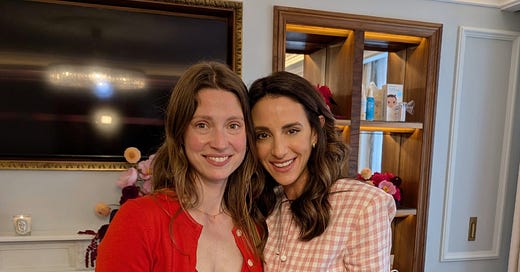


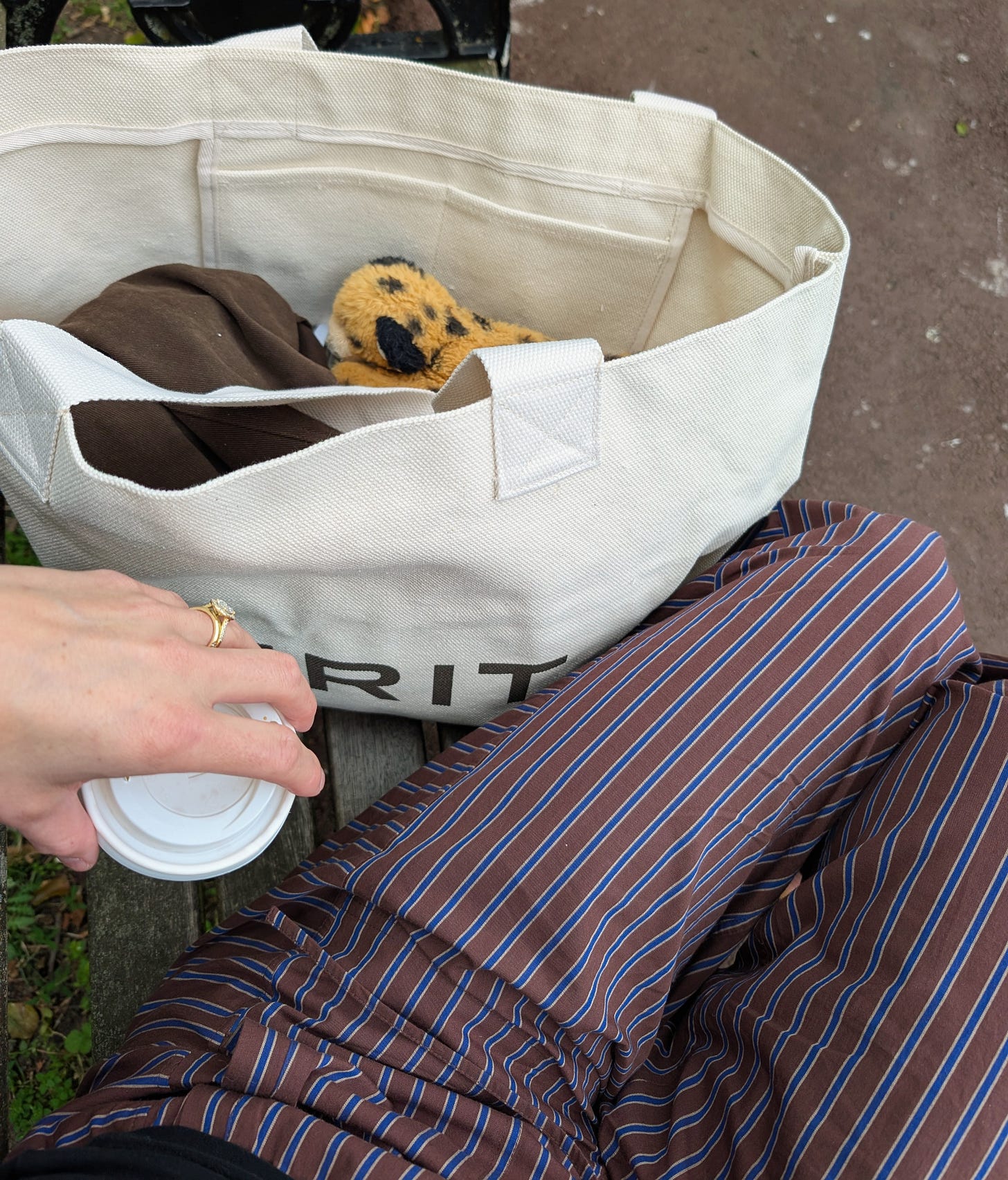
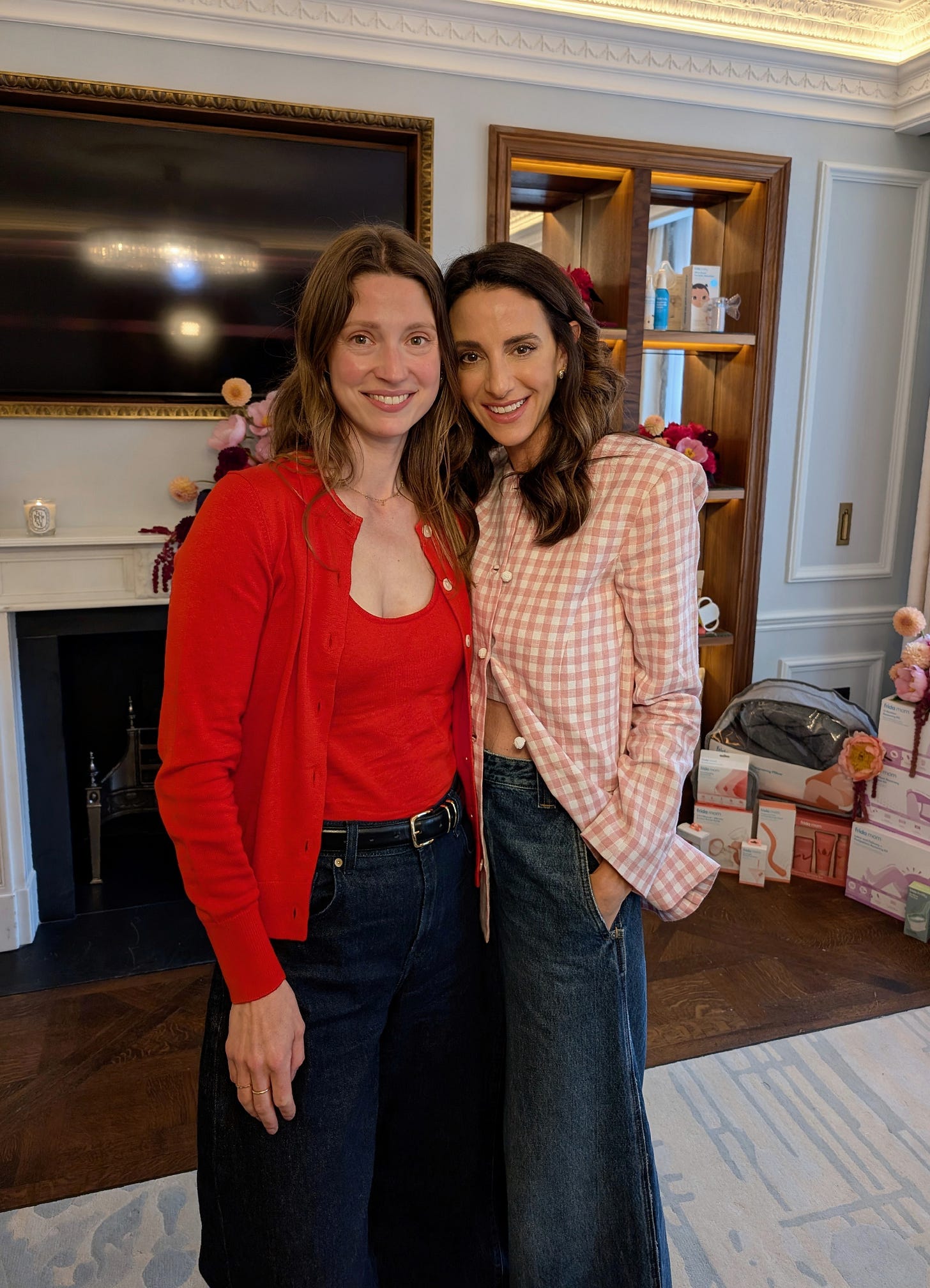

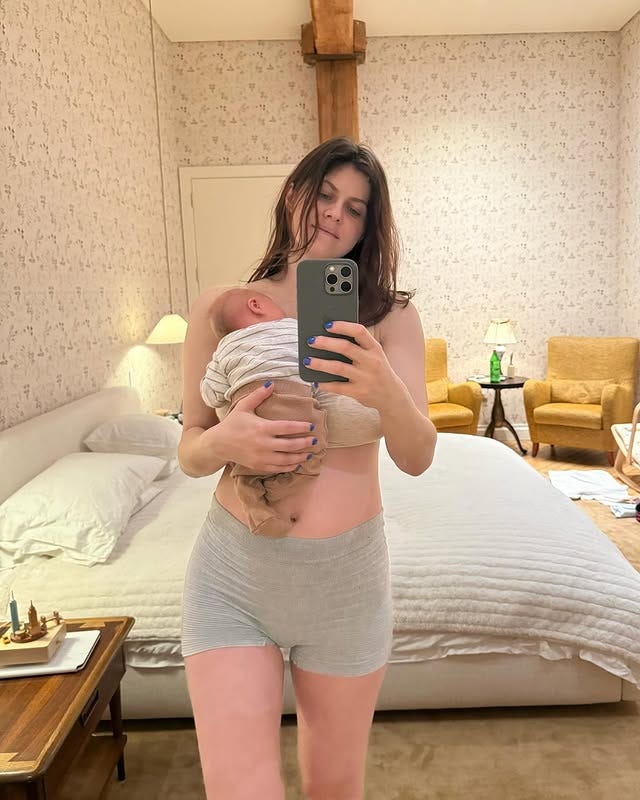
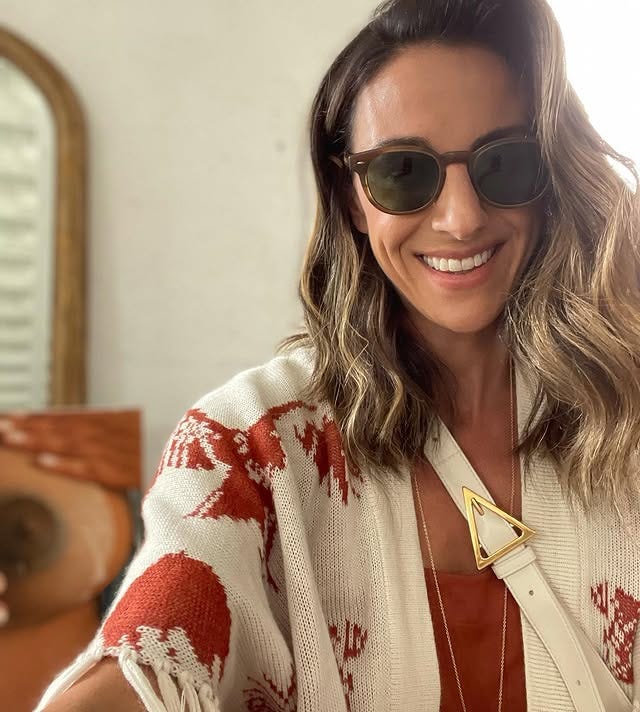
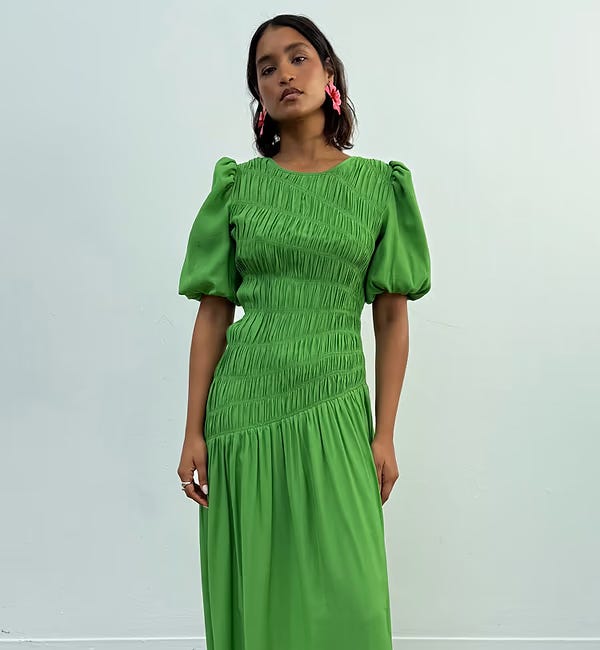
Wow love this!! I need Chelsea on my Creative Parenting substack! 🙏🏼
Frida mum is the greatest company in the world. I ran out of the ice packs and paid €75 in shipping to get them to the Netherlands from the US! It’s now what I gift every expecting mom. I am not surprised by everything this company is doing for moms everywhere outside of their products!! Love love love Frida